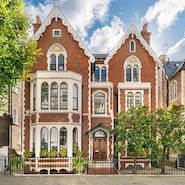 Kensington, London home on sale via Christie's
Kensington, London home on sale via Christie's
Stagnation in the luxury real estate market of the world’s biggest cities is counterbalanced by the emergence of new hubs, according to a new report by Christie’s International Real Estate. London and New York have slowed down recently, but less prominent markets that were slower recovering from the recession are continuing to perform admirably. With the post-recession boom over, exchange rates and a host of other political and financial concerns have shaken up the market, creating opportunities and challenges heavily dependent on geography. "Geopolitical uncertainty and equity market volatility have begun to weigh on prime property sales in some global economic hubs, particularly at the upper ends of the market where choice as opposed to necessity is the primary driver of buying and selling decisions," said Monique Sofo, vice president of strategy at Christie's International Real Estate. "Annual luxury home sales volumes have returned to single digit increases, and are back to more historically normal levels than we’ve seen in the last few years.
"Currency shifts are also having an impact, favoring some markets and penalizing others," she said. "A weaker euro combined with significantly lower than peak property prices have prompted an uptick in overseas buyer demand in several 'comeback' markets such as Paris and Dublin, which saw 21 percent and 11 percent year-on-year growth in luxury sales respectively. Dublin’s top sale in 2015, which closed in excess of €10 million, was sold by our Affiliate SherryFitzgerald to an American buyer and was the city’s highest price residential sale since the downturn."
The annual “Luxury Defined” study includes data and overviews of various luxury markets around the world, analyzing the economic trends that have impacted various cities and more specifically defining what constitutes “luxury” in each market. New players Despite slowdown, the top property markets are exactly what one would expect: London remains on top for the fourth year in a row despite slower growth and new taxes. Hong Kong’s decline did not push it out of second place and New York, Los Angeles and the newly emergent Singapore round out the top five. Sydney, Miami, San Francisco, Paris and Toronto place sixth through tenth, with Dubai, United Arab Emirates being knocked out of the top 10 altogether. Reasons for each market’s rise or decline are briefly synopsized in the white paper. Among the macroeconomic happenings contributing to the relatively volatile real-estate market are China’s slowdown, a sharp decline in oil prices and instability in Eastern Europe, Russia and the Middle East. Even so, high-end real estate continues to be a more stable investment than the stock market, so high-net-worth-individuals will likely continue investing. Indeed, the second-home resort market saw a 10 percent rise in home sales with an average of 7 percent growth in primary markets. The strong U.S. dollar and weak euro resulted in a jump in U.S. citizens purchasing European homes, while the exchange rate worked negatively for Canadians. Middle Eastern buyers, meanwhile, comprised 27 percent of overseas buyers of Parisian homes. As oil and Middle Eastern currencies have declined in value, HNWIs have transferred assets to safer currencies. “Opportunity markets” included in the report as a result of global currency shifts include Argentina, Canada, Colombia and South Africa, all of which are profiled in more detail. The report also shines a light on comeback cities and more affordable growth markets. Auckland, New Zealand; Dublin; Monterrey, Mexico; Detroit and Atlanta have all seen turnaround after recent paralysis. These cities and more are examined, with data regarding luxury pricing, market growth and time-on-market presented alongside the primary force of growth, from Atlanta’s film and television industry to Dublin’s tech sector and Portland’s entrepreneurship. The measures that the United States, Australia and Switzerland have taken to limit overseas buyers are also examined. On the flip side, Canada and New Zealand have opened their doors with positive results. The full white paper is available for free download here. Steady but slowing Overall, the real estate sector is continuing to grow, albeit not as promisingly as in the post-recession years. Global prime residential real estate continued its steady climb in the first quarter of 2016, according to a recent report by Knight Frank. The index increased 3.6 percent, within the 3-4 percent window observed every quarter since late 2014. However, this is a result of a handful of booming markets rather than stable growth across the board, meaning the 3.6 percent number obscures the fall of some markets (see story). The U.S. is seeing the same trend globally, with traditional players slowing as emergent hubs surge. Silicon Valley, CA communities are experiencing a shortage of inventory at the high-end, but new cities are emerging as luxury hubs, according to a report by Coldwell Banker. Austin, TX; Fort Lauderdale, FL and Seattle each experienced impressive growth in sales at the $1 million price level. The emergence of these cities as entry-level luxury hubs and other sales patterns could indicate a stable market in 2016 (see story). "Although recent global economic volatility has given some luxury homebuyers pause, luxury real estate as an asset class remains an important component of the portfolios of the world’s most affluent individuals," Ms. Sofo said. "After years of widely reported capital outflows, China’s slowing economy has yet to have significant impact on the global luxury property market, with most of our brokers reporting an increase in Chinese buyers and only a few observing a slight drop-off. "In 2015, some of the highest priced residential sales in numerous markets worldwide went to mainland Chinese buyers," she said. "We anticipate this demand will continue as affluent buyers look for greater geographic portfolio diversification."